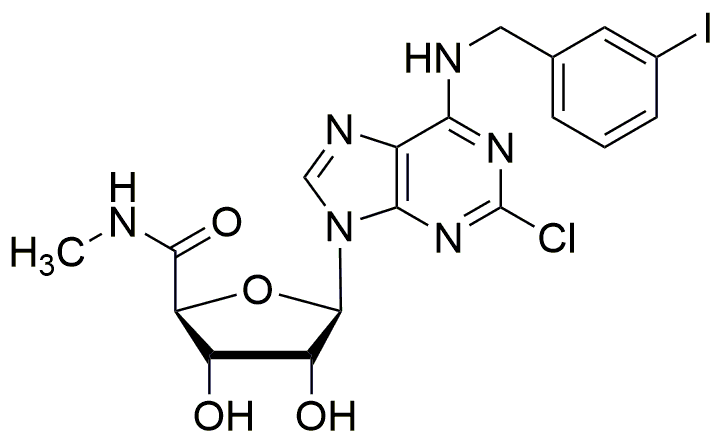Chloro-IB-MECA is widely utilized in research focused on:
- Pharmaceutical Development: This compound is significant in the development of drugs targeting the adenosine receptor system, which plays a crucial role in various physiological processes. Its unique structure allows for enhanced binding affinity, making it a valuable candidate for new therapeutic agents.
- Cancer Research: Researchers are exploring its potential in oncology, particularly in modulating tumor microenvironments. Chloro-IB-MECA may help in developing treatments that improve the efficacy of existing cancer therapies.
- Neurological Studies: Its application in neuropharmacology is promising, especially in studying neurodegenerative diseases. The compound's ability to influence adenosine pathways could lead to breakthroughs in managing conditions like Alzheimer's and Parkinson's disease.
- Cardiovascular Research: Chloro-IB-MECA is being investigated for its effects on heart health, particularly in understanding how it can help regulate blood flow and reduce ischemic damage during heart attacks.
- Immunology: The compound shows potential in modulating immune responses, making it a candidate for research into autoimmune diseases and inflammatory conditions, where controlling the immune system is crucial.
General Information
Properties
Safety and Regulations
Applications
Chloro-IB-MECA is widely utilized in research focused on:
- Pharmaceutical Development: This compound is significant in the development of drugs targeting the adenosine receptor system, which plays a crucial role in various physiological processes. Its unique structure allows for enhanced binding affinity, making it a valuable candidate for new therapeutic agents.
- Cancer Research: Researchers are exploring its potential in oncology, particularly in modulating tumor microenvironments. Chloro-IB-MECA may help in developing treatments that improve the efficacy of existing cancer therapies.
- Neurological Studies: Its application in neuropharmacology is promising, especially in studying neurodegenerative diseases. The compound's ability to influence adenosine pathways could lead to breakthroughs in managing conditions like Alzheimer's and Parkinson's disease.
- Cardiovascular Research: Chloro-IB-MECA is being investigated for its effects on heart health, particularly in understanding how it can help regulate blood flow and reduce ischemic damage during heart attacks.
- Immunology: The compound shows potential in modulating immune responses, making it a candidate for research into autoimmune diseases and inflammatory conditions, where controlling the immune system is crucial.
Documents
Safety Data Sheets (SDS)
The SDS provides comprehensive safety information on handling, storage, and disposal of the product.
Product Specification (PS)
The PS provides a comprehensive breakdown of the product’s properties, including chemical composition, physical state, purity, and storage requirements. It also details acceptable quality ranges and the product's intended applications.
Certificates of Analysis (COA)
Search for Certificates of Analysis (COA) by entering the products Lot Number. Lot and Batch Numbers can be found on a product’s label following the words ‘Lot’ or ‘Batch’.
Número de catálogo
Número de lote/lote
Certificates Of Origin (COO)
This COO confirms the country where the product was manufactured, and also details the materials and components used in it and whether it is derived from natural, synthetic, or other specific sources. This certificate may be required for customs, trade, and regulatory compliance.
Número de catálogo
Número de lote/lote
Safety Data Sheets (SDS)
The SDS provides comprehensive safety information on handling, storage, and disposal of the product.
DownloadProduct Specification (PS)
The PS provides a comprehensive breakdown of the product’s properties, including chemical composition, physical state, purity, and storage requirements. It also details acceptable quality ranges and the product's intended applications.
DownloadCertificates of Analysis (COA)
Search for Certificates of Analysis (COA) by entering the products Lot Number. Lot and Batch Numbers can be found on a product’s label following the words ‘Lot’ or ‘Batch’.
Número de catálogo
Número de lote/lote
Certificates Of Origin (COO)
This COO confirms the country where the product was manufactured, and also details the materials and components used in it and whether it is derived from natural, synthetic, or other specific sources. This certificate may be required for customs, trade, and regulatory compliance.


